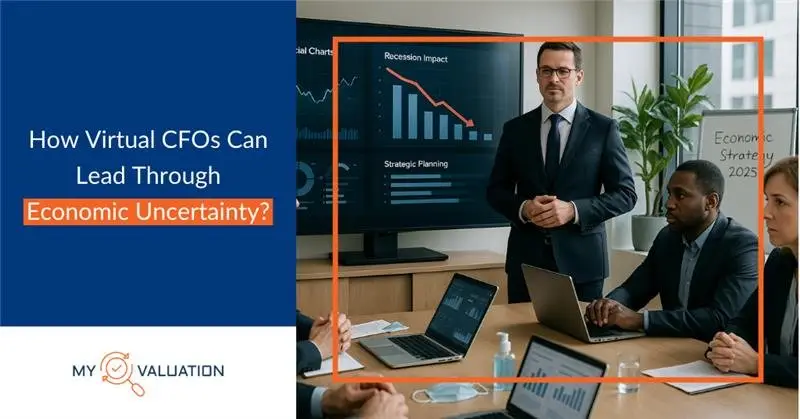Responding to economic storms requires a steady financial hand at the helm. For startups and SMEs facing inflation, funding slowdowns, or regulatory shifts, financial resilience isn't optional—it's survival.
Virtual CFOs have emerged as crucial guides during these uncertain times. They provide strategic financial leadership without the overhead of a full-time executive.
But what exactly makes them so valuable when economic conditions become unpredictable? Let's explore the most pressing questions businesses are asking about Virtual CFO services during economic uncertainty.
What is a Virtual CFO and how do they differ from traditional CFOs?
A Virtual CFO delivers high-level financial expertise on a flexible basis. These professionals function as financial architects who build custom solutions for your specific business challenges.
Unlike traditional CFOs who work exclusively for one company, Virtual CFOs typically serve multiple clients. This arrangement provides them with broader perspective across various industries and economic conditions.
Their responsibilities include financial strategy, reporting, forecasting, and compliance—all delivered through a cost-efficient model that scales with your business needs.
| Traditional CFO | Virtual CFO |
|---|---|
| Full-time, in-house position | Part-time, retainer, or project-based |
| Single company experience | Multi-industry expertise |
| Fixed comprehensive compensation | Flexible payment models based on scope |
| Physical office presence | Remote collaboration |
| Best for established companies | Ideal for startups and growth-phase businesses |
Why do businesses need Virtual CFOs during economic uncertainty?
Economic volatility demands more than basic bookkeeping—it requires sophisticated financial foresight. During unstable times, a Virtual CFO becomes your financial navigator, helping you:
- Anticipate cash flow challenges before they become critical
- Create contingency plans for various economic scenarios
- Identify hidden financial risks within your business model
- Strengthen investor confidence when raising capital becomes challenging
Most importantly, Virtual CFOs transform reactive financial management into proactive strategy. They provide clarity and direction when economic visibility is limited.
How can a Virtual CFO improve your cash reserves during crises?
Cash preservation becomes priority number one during economic uncertainty. A skilled Virtual CFO extends your runway through strategic interventions:
They implement cash flow forecasting models that predict financial health under various scenarios. This approach replaces intuition with data-driven decision-making.
Your Virtual CFO will assess expenditure optimization opportunities, identifying areas to reduce spending without hampering growth potential. They distinguish between essential operational costs and discretionary expenses.
They also develop working capital management strategies to improve your cash conversion cycle. These strategies may include renegotiating payment terms or optimizing inventory management systems.
Consider this scenario: A technology startup facing funding challenges worked with a Virtual CFO to significantly extend their operational runway—without reducing staff—by restructuring contracts and identifying inefficient spending patterns.
Can a Virtual CFO help with fundraising when investors are cautious?
Absolutely. In fact, having a Virtual CFO can significantly improve your fundraising prospects during challenging economic periods.
When investors become more selective with their investments, they scrutinize financial fundamentals with greater diligence. Your Virtual CFO develops:
- Investor-ready financial models that withstand rigorous due diligence
- Realistic growth projections adjusted for current market conditions
- Valuation frameworks that reflect contemporary market realities
- Capital efficiency metrics that demonstrate responsible financial management
Virtual CFOs essentially serve as translators between your business vision and investor expectations. By articulating financial information effectively, they facilitate connections to funding sources even during conservative investment climates.
What financial tools do Virtual CFOs use to address economic volatility?
Professional Virtual CFOs utilize specialized tools and methodologies to guide businesses through periods of uncertainty:
Scenario planning enables them to model best-case, expected-case, and worst-case financial outcomes. This approach replaces single-point forecasts with probability ranges for more robust planning.
Rolling forecasts provide continuously updated financial projections instead of static annual budgets. This methodological agility is essential when economic conditions change rapidly.
Financial dashboards offer real-time visibility into critical performance metrics. These analytical tools enhance decision-making through continuous monitoring rather than periodic reviews.
Competitive benchmarking contextualizes your company's performance against industry standards. This comparative analysis helps determine whether financial challenges are company-specific or reflective of broader market conditions.
How do Virtual CFOs help with financial compliance during hard times?
Regulatory compliance requirements continue unabated during economic uncertainty—and often become more stringent. Your Virtual CFO ensures ongoing compliance while simultaneously managing financial pressures.
They oversee:
- Tax planning and compliance across various direct and indirect tax regimes
- Statutory reporting under the Companies Act and other applicable regulations
- Foreign exchange compliance under FEMA guidelines for international transactions
- Investor reporting requirements for funded enterprises
This comprehensive compliance management prevents costly penalties and maintains stakeholder trust during periods when regulatory missteps could prove particularly detrimental to business stability.
How quickly can a Virtual CFO impact your business during economic crises?
The implementation timeline varies according to business complexity, but most organizations experience meaningful impact relatively quickly after engaging a Virtual CFO.
During the initial engagement period, they typically conduct a comprehensive financial health assessment, identify immediate risk factors, and implement appropriate cash conservation measures.
As the engagement progresses, you can expect development of a more comprehensive financial strategy, implementation of enhanced reporting systems, and creation of forecasting models tailored specifically to your business requirements.
The most substantial value materializes as the Virtual CFO's understanding of your business operations deepens and longer-term strategic initiatives take effect throughout the organization.
Conclusion
Economic uncertainty need not result in financial stagnation. With the guidance of a skilled Virtual CFO, challenging circumstances can transform into opportunities for enhanced operational efficiency, strategic realignment, and sustainable business growth.
The appropriate Virtual CFO delivers more than financial expertise—they provide essential strategic clarity. They offer precise analysis when market conditions appear ambiguous and steady direction when the path forward seems uncertain.
For Indian startups and SMEs navigating today's multifaceted economic landscape, a Virtual CFO represents a potentially transformative addition to the leadership team. These professionals help organizations not merely endure uncertainty, but emerge with enhanced capabilities and positioning.
My Valuation offers experienced Virtual CFO services specifically designed for Indian businesses facing contemporary economic challenges. Contact us today to know how our financial leadership can help your organization move through economic uncertainty with confidence.




